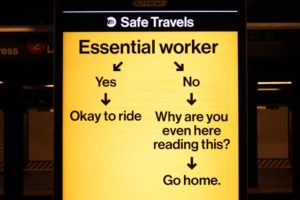Do you have a preconceived idea of what grief is or what circumstances in life call for it? The grieving process can be challenging, but it can also bring healing.
Grief is a reaction to loss, but there are no rules on what losses call for grief. While it may seem obvious that someone who has experienced the death of a loved one will experience grief, other losses can also trigger grief.
And sometimes, the first step in successfully navigating the complicated grief process is to name what you are feeling. When you can name it, you can learn to manage it.
Grief in the Time of COVID
Everyone in the world has been affected by the global pandemic called COVID 19. But that doesn’t mean we are all experiencing the same situation. We all, however, are experiencing grief on some level.
I have heard it said that we are all in the same storm, but each of us is in our own boat. I believe that is an excellent way to see it. We are all dealing with the storm of COVID 19, but we have our own set of circumstances to deal with.
Hundreds of thousands of people are dealing with the loss of a loved one. Millions are struggling financially after losing income. Too many people have no idea where their next meal will come from or if they will lose their home.
I would imagine most people, especially those who live alone, are finding it difficult to “social distance” from their family members and friends.
Long-anticipated trips have been canceled. Weddings are put on hold, funerals are limited to no more than ten attendees, and special occasions are celebrated alone or online.
Graduates all across the United States have missed out on so many special activities, including Senior Walk, Prom, and graduation services.
Sports have been canceled, and while many athletes and their fans are left disappointed, it has also meant the loss of scholarship money or recognition as “champion” for many.
Daily life as we knew it has changed in so many ways. Jobs have been suspended or lost, people are afraid to seek health care from their doctor or a hospital when they are sick or hurt, and important surgeries have been canceled.
A simple trip to the grocery store can feel like a death-defying act, and it can leave you frustrated and angry when you find bare shelves instead of the things you needed most. We are now afraid of physical closeness. Hugs, kisses, and handshakes will never again occur with the same frequency as they used to.
Then there are those who have to work, even if they don’t want to. Some feel cheated by those who can stay at home while making more money from unemployment than they make from risking their lives while working 40 hours a week.
Any and all of these scenarios–and many more–can cause grief. It is all around us, in our families and the families of our friends, neighbors, and co-workers.
So the question is, how do we deal with it?
The Stages of Grief
A well-known and often recommended book for those dealing with grief is On Grief and Grieving: Finding the Meaning of Grief through the Five Stages of Loss by Elisabeth Kübler Ross. In her book, Ms. Ross goes into detail about each of the five stages of grief.
It is important to realize, however, that this process is not an exact science of how grief works. Very few, if any, people go from one stage to the next in a linear fashion. Instead, we tend to bounce around and move back and forth through the stages.
Most people, however, do experience each stage at least once, and while we may never stop missing what we lost, the final stage brings us to acceptance.
The stages of grief are:
- Denial
- Anger
- Bargaining
- Depression
- Acceptance
Denial
Usually, the first stage of grief, denial, can actually help you cope when you first learn of a loss. At least for a little while. It sounds like, “This can’t be happening,” “No one I love will die,” “It’s all just media hype,” or even, “The whole idea of a virus is a hoax.”
Anger
Once we realize the virus is real, people are dying, and everything about life as you know it has changed, the anger sets in. Parents are mad about schools closing, especially when they realize they have unexpectedly become homeschool teachers. Athletes and fans are angry about canceled sports competitions. People go crazy with angry posts on social media.
There is so much to be mad about, and we end up taking it out on each other.
Bargaining
The anger comes and goes, but somewhere in there is bargaining. People beg others to shelter in place and not break the rules, hoping this will end the madness and magically reopen businesses. It sounds like, “If everyone just does what they are supposed to, things will return to normal.”
Depression
Then depression sets in. “We’re all going to die,” “Everything is ruined,” and “This will never end” leaves us feeling helpless and hopeless. The fact that we are instructed to stay home and cannot hang out with friends and family for support only worsens the depression and keeps us isolated.

So, when does acceptance come?
Learning to Accept Your New “Normal”
Things have changed forever. Just like going to an airport and getting on a plane will never be like it was before 9/11.
Can we ever again feel safe shaking someone’s hand or giving a hug and kiss to those we love?
We may have to learn to settle with a fist or elbow bump.
But acceptance is where your power lies. You gain control with acceptance. Sure, things are different, but you can learn proper hand hygiene, accept and appreciate safe distances, and figure out how to work virtually.
When you accept the new normal and understand the difference between things you can control and things you can’t, you gain power. You change what you can and accept what you can’t change.
More than anything else, this acceptance helps you avoid anticipatory grief.
What is anticipatory grief?
Have you ever experienced a potential disaster that spelled an unsure future and filled you with dread? Maybe there was a terrible storm, and then the tornado sirens started going off. Or possibly your doctor suspected cancer and wanted further diagnostic testing.
Whatever the scenario, you visualized and feared the worst outcome.
COVID has caused a lot of anticipatory grief. So many people worry about worst-case scenarios. They fear the death of a parent, a sibling, or a child. They worry about their own health and the health of those around them, especially those who are immunocompromised or terminally ill.
But how does that help?
Sure, if the tornado sirens are going off, you can prepare a safe room with pillows, water, and food. During COVID, you can stock up on essentials and pack your pantry with canned goods, rice, and dried beans.
Planning is good, but what does worry do? Worrying about “what if” won’t change things for the better. It only adds to your emotional pain.
What can you do for grief?
While it may seem like everything is out of control, there are things you can do.
- Accept what you cannot control and improve the things you can
- Figure out your new normal
- Counteract “worst-case scenarios” with things you are grateful for
- Socialize with friends and family through available apps, such as Zoom, FaceTime, and Whatsapp.
- Talk to someone you trust about your feelings
- Seek professional help with a counselor
Are you interested in talking with someone who can help?
Dr. Lonnie Bryant is an anger and grief expert. If you need some guidance during these difficult, unprecedented times, you can trust his knowledge and experience.
Whether you grieve because a loved one died or you just don’t know how to accept your new normal, he can help.
Call or text (682) 365-2099 today to schedule your complimentary 20-minute phone consultation. During this call, Dr. Bryant will take the time to get to know you and answer your questions.
If you both agree he can help, he will schedule your first appointment. Dr. Bryant can meet with you face-to-face in one of his three offices, or he can visit with you virtually for a secure, confidential online session.


